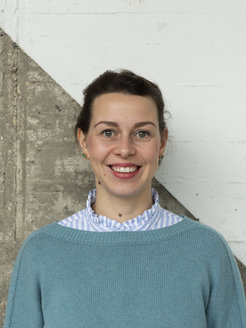"This is us" - Questions for Anne-Marie Nussberger
Our institute has over 300 employees. But that is just a number. Who are the people at our institute? What do they do and what drives them? In our "This is us" format, colleagues answer questions about their work and their motivation.

On the occasion of International Women's Day on March 8, 2023, we started the series “This is us” with 15 female scientists from our institute. We are picking up where we left off and introducing the scientist Anne-Marie Nussberger from the Center for Humans and Machines. In the last episode we introduced Marwa El Zein from the Center for Adaptive Rationality.
At the Research Center for Humans and Machines, you explore human-machine interactions, considering various frameworks from the fields of social psychology, behavioral economics and cultural evolution. What fascinates you about this topic?
Above all, that "the topic" is so multifaceted and that it is relevant to our everyday lives even now, but probably still more in future. For example, we are researching the extent to which "classic" findings on human decision-making and behavior can be transferred to intelligent machines; be it with regard to the decision-making behavior of these machines or with regard to human decisions in regarding these machines. From a cultural-evolutionary perspective, we then try to anticipate how human-machine interactions could influence and change decision-making on both sides over time. Specifically, I explore questions such as: can intelligent machines (e.g., GPT) generate as convincing apologies as humans? Does it make a difference to people whether an apology is generated by a machine, or by a human – and if so, to what extent and why? Could this lead to a re-evaluation of apologies in the medium term (for example, a devaluation)?
The first two questions are directly linked to existing findings from social psychology, sociology and behavioral economics; the last question is aimed at cultural-evolutionary implications.
What is cultural evolution and what influence does AI have on it? (or could have in the future?)
Essentially, we understand cultural evolution to be a dynamic process that describes the social transmission and development of values, traditions, and knowledge. In fact, we just published a paper in which we introduce "Machine Culture”: how intelligent machines can mediate or generate cultural evolution. There are already instances of machines changing the diversity of cultural information. For example, in the ancient strategic game of Go, where an AI called AlphaGo dethroned the reigning human world champion Lee Sedol in 2016 with a very unconventional move (from a human perspective). Since then, the Go game of human players has become measurably more diverse with more novel moves that had never been observed since professional Go tournaments have been recorded being observed. We also expect that machines will increasingly influence the transmission of cultural information, for example through Large Language Models such as GPT. And it is already evident that machines are selecting what information and information sources we are exposed to in the digital world of social networks or online media. We anticipate that the influence of machines across these three fundamental dimensions of cultural evolution – the variation, transmission and selection of cultural information – will fundamentally influence its continuation.
When did you decide to become a scientist? How did you decide on this field of study?
In my case, it was not a very straightforward path; but something that drove me early on was to understand human decision-making and behavior, and how they define social realities. I started by focusing on the social realities, so to speak, by studying European Studies in Maastricht. However, after six months I realized that the course was far too broad for me personally. So, I decided to approach those conundrums from the other side by studying psychology. However, the psychology course in Heidelberg was too narrow and focused on clinical aspects for my taste – so then I also studied economics. The intersection, "behavioral economics", really appealed to me and motivated me to go deeper into science with a research-oriented master's program. Throughout my master's and doctoral studies, I worked on social decisions and, towards the end of my doctorate, expanded the circle of "social" to include human-machine interactions. I am thrilled that as a scientist I can pursue my passionate interests and that my work is so diverse: from theoretical musings to creative phases of developing experimental paradigms and flow-like states in data analysis, to writing up our findings for journals and communicating them to the wider public. Even if being a scientist has its downsides, these sunny sides are a privilege for me, for which I am grateful.
How do you reconcile family and career?
The biggest challenge as a junior scientist is the much-lamented planning uncertainty in view of temporary positions, rather uncertain prospects, and so on. I experience this uncertainty as still more challenging since having children, aged 1 and 3 by now. We would like to "settle down" somewhere as a family; – without commuting, without moving from city to city. However, at this point in my career, my first postdoc, it is not realistic to settle in a city and landing an academic job there; and it will be even less realistic if my partner goes back into academia. In my current everyday life, however, I can combine family and career pretty well, as our director Iyad Rahwan and my colleagues are sympathetic to the variable needs and sometimes almost unbelievable chains of illnesses that come with toddlers.
What do you like about the Max Planck Community?
I find that an incredible number of intrinsically motivated, versatile, cooperative scientists come together here, creating a particularly stimulating working environment. The exceptionally good conditions under which we can work certainly contribute to this selection; and also to the fact that we can concentrate strongly on our research.
